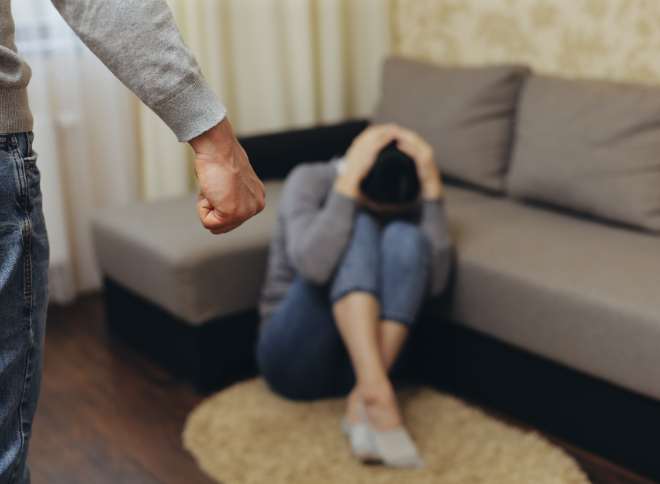Domestic violence is a pattern of abusive behavior that an adult will inflict upon a spouse, intimate partner, or former partner. The individual uses these behaviors to have power and control. Understanding what is considered domestic violence in Florida is crucial both for your legal rights and personal safety. Florida domestic abuse laws include various actions that would constitute domestic violence. From assault and battery to sexual crimes and stalking, domestic violence encompasses many abusive behaviors that can happen to anyone at any time.
Legal Definition of Domestic Violence in Florida
When answering the question, “What is considered domestic violence in Florida?” it is essential to be familiar with the definition of domestic violence and the full scope of abusive behaviors that domestic violence can include.
Under Florida Statutes Section 741.28, domestic violence means any:
“Assault, aggravated assault, battery, aggravated battery, sexual assault, sexual battery, stalking, aggravated stalking, kidnapping, false imprisonment, or any criminal offense that results in physical injury or death of one family or household member by another family or household member.”
These criminal actions incorporate three primary types:
- Physical
- Emotional
- Psychological
The harm that domestic violence inflicts includes physical harm to the body, as well as emotional and psychological harm. Each type can be very severe in nature, inflicting highly negative consequences on an intimate partner or family member.
It is essential to know these different types are a part of Florida domestic abuse laws for legal and personal safety.
What Constitutes Domestic Violence in Florida?
Many think domestic violence is primarily physically abusive actions such as hitting or kicking. Unfortunately, this is common. But what constitutes domestic violence, according to Florida, is much more expansive.
As mentioned under the definition above in Florida Statutes Section 741.28, the state includes a variety of offenses:
- Assault
- Battery
- Sexual Assault and Battery
- Stalking
- Emotional and Psychological Abuse
- Kidnapping and False Imprisonment
Abusers will use this unlawful behavior to frighten, intimidate, threaten, and coerce the family or household member. In many situations where a wife or other intimate partner is a victim of domestic violence, multiple types, as listed above, are used. Additionally, the types of abusive actions often increase in intensity and frequency over time, leading to more dangerous situations.
Know that domestic violence includes more than physical harm; it also includes emotional and psychological abuse.
Florida Domestic Abuse Laws
The statutory laws that define and penalize domestic violence in Florida are clear about what domestic violence is, who could be a perpetrator, protective measures, and possible punishments.
Now that we have covered the definition of what is considered domestic violence in Florida, the following will give you other key information you need to know.
The law lists that perpetrators of domestic violence are “family or household members,” which can include:
- Husbands and wives
- Ex-husbands and ex-wives
- People who live together as a family
- People who used to live together as a family
- People who are related by marriage or blood
- People who share a child together (whether or not they ever lived together or were married)
Florida Statutes Section 741.30 provides legal avenues for protection against domestic violence through injunctions (commonly known as restraining orders). The courts can order emergency, temporary, and permanent injunctions. Emergency/temporary injunctions are typically enacted immediately once an application is submitted and the judge considers the application valid.
Injunctions are protective measures that limit the ability of the abuser to contact or be in the physical presence of the individual who is being/has been harmed. This can often come as being unable to go to their victim’s home, work, college, etc., or contacting them by phone.
There are multiple types of possible punishments for those who commit domestic violence.
Florida Statutes Section 741.283 lists mandatory minimums for those who are convicted, including:
- First offense – minimum of 10 days in county jail
- Second offense – minimum of 15 days in county jail
- Third or subsequent offense – minimum of 20 days in county jail (unless the court sentences the person to a nonsuspended period of incarceration in a state correctional facility)
Other penalties that a judge may order if an individual is convicted include:
- Paying fines and court costs
- Complete community service per court order
- Attend an alcohol or drug program
- Probation
Additionally, if an individual violates a domestic violence injunction that has been imposed on them, they may face:
- Up to one year in jail and/or
- One year of probation
The law defines acts of domestic violence through the perpetrator’s relationship with the victim. There are differences under Florida Statutes that separate crimes, such as battery, outside the scope of domestic violence laws.
Difference Between Domestic Violence and Battery
While battery is included as a domestic violence charge, Florida law does delineate a difference between domestic violence and battery.
Florida Statutes Section 784.03 details the definition of battery when an individual “actually and intentionally touches or strikes another person against the will of the other, or intentionally causes bodily harm to another person.”
Here are a few examples of battery under Florida law:
- A man gets inebriated at a bar, gets upset at something another man said, and punches him in the face.
- A man gets upset at a female neighbor for mowing her lawn early on a Sunday morning. He goes over to her yard, gets into an argument with her, shoves her to the ground, and kicks her several times.
- A man is dating a woman he is not living with – and they do not have a child together. They get into an argument, and he hits her several times.
- A woman argues with a friend who borrowed money from her and has not given it back. She slaps her friend in the face and slams her against the apartment wall.
The examples above list battery between two people that are not in (or formerly in) the type of relationship that would apply to a domestic violence charge, including neighbors, strangers, friends, and dating relationships where no children are involved and the two people live in separate residences.
Know that victims of dating violence can seek out a dating violence injunction, protecting those in danger of violence in the same way as domestic violence injunctions (also commonly known as restraining orders).
Battery is a first-degree misdemeanor with a maximum punishment of one year in jail and a $1,000 fine. Depending on the battery’s severity, it could increase to an aggravated battery charge.
Domestic violence charges have mandatory minimums upon conviction and can be misdemeanors or felonies, depending on the circumstances.
Physical Harm
Domestic violence covers a broad range of actions that physically harm another person. It is not limited to physical battery and can be deemed abusive or violent in a domestic setting.
Physical harm can be in the form of restricting food and water from another person to the extent it harms their physical health. A spouse may have limited movements, like being locked in a small room or tied to a bed or furniture. An abuser may force their intimate partner to have sex or engage in unwanted sex acts. Other types of physical violence can include throwing objects and punching doors and walls.
Emotional and Psychological Harm
When discussing the question, “What is considered domestic violence in Florida?” it is important to include emotional and psychological harm.
Emotional and psychological harm is included within the legal framework of domestic violence under Florida law.
Actions that would equate to domestic violence may include:
- Statements intended to cause fear
- Statements that cause someone to question their value or self-worth
- Name-calling and yelling
- Verbal threats to children or pets
- Preventing a person from seeing their friends or family
- Preventing a person from leaving the house, getting a job, or continuing an education
Physical, emotional, and psychological harm are serious acts of domestic violence – affecting couples, families, and children in so many ways. They are life-changing – and can have major consequences.
How Serious is a Domestic Violence Charge?
Domestic violence charges are not taken lightly by Florida courts and law enforcement. But it goes even further than that – affecting multiple areas of a person’s life. From legal penalties to social repercussions, it is necessary to understand the dire consequences facing those convicted of domestic abuse.
Legal Consequences of Domestic Violence
The charges associated with domestic violence can be either misdemeanors or felonies, depending on previous related charges and the severity of what happened, including whether or not any deadly weapons were used.
Typically, misdemeanors are either first-time offenses or incidents that did not result in a serious injury or strangulation. Felonies are typically charged when people violate a domestic violence injunction, are repeat offenders, or cause serious harm.
There are a variety of legal penalties, including but not limited to:
- Incarceration – up to 1 year in jail for misdemeanors; up to 5 years in prison for felonies
- Fines – court fines and fees
- Restraining orders – restricting movements and contact with the victim
- Mandatory counseling – completion of a batterer’s intervention program
Increased penalties include much longer incarceration when offenses result in serious bodily injury or if a dangerous weapon, such as a knife or a gun, is involved, which can include a sentence of up to 20 years in prison.
Life-Altering Repercussions
A domestic violence charge can significantly alter the course of one’s life. In addition to serious legal penalties, it can impact employment opportunities, making it hard to obtain a job or even work in your industry of choice. An individual can face ongoing financial difficulty – not only in the short term but also in the long term.
It can affect social relationships with friends, family, the community, and other personal, intimate relationships in the future. Child custody arrangements can be changed, leading to limitations on spending time with children or keeping someone from seeing them at all. If convicted, you can never own a firearm.
Take Action: The Importance of Understanding and Reporting
It is extremely important to be educated on domestic violence laws in Florida – and to report incidents when they occur. The laws are in place to protect victims and punish abusers.
Working with a lawyer is paramount to securing the best results. Dean Tsourakis understands the complexity of the laws and has experience in domestic violence cases. No one should ever have to deal with the emotional, psychological, and physical harm of abuse.
Don’t wait any longer and take the first step.
Contact Dean Tsourakis today to set up a free consultation. He can help you free yourself from a violent and abusive environment.
on Nov 6, 2023




